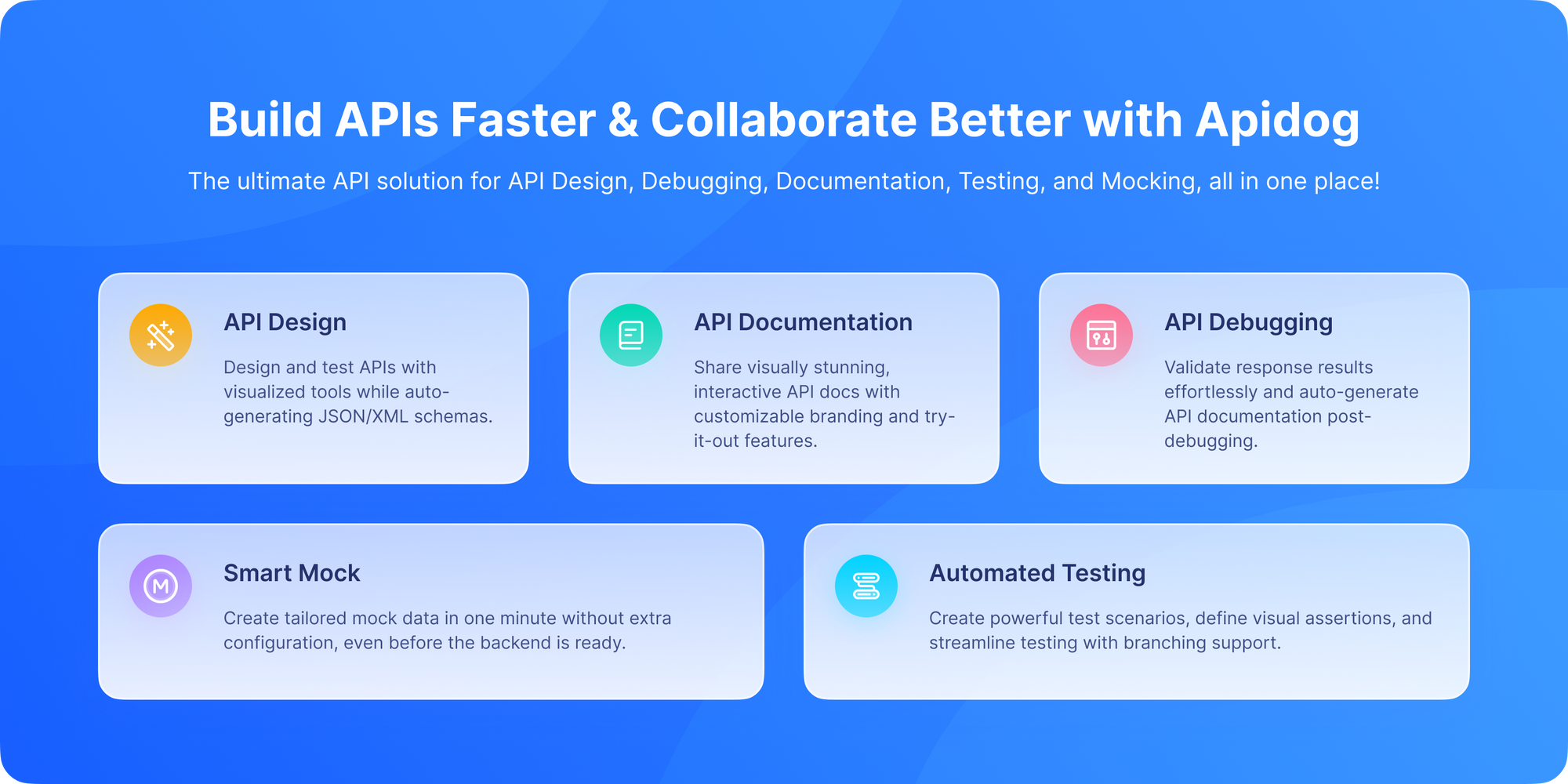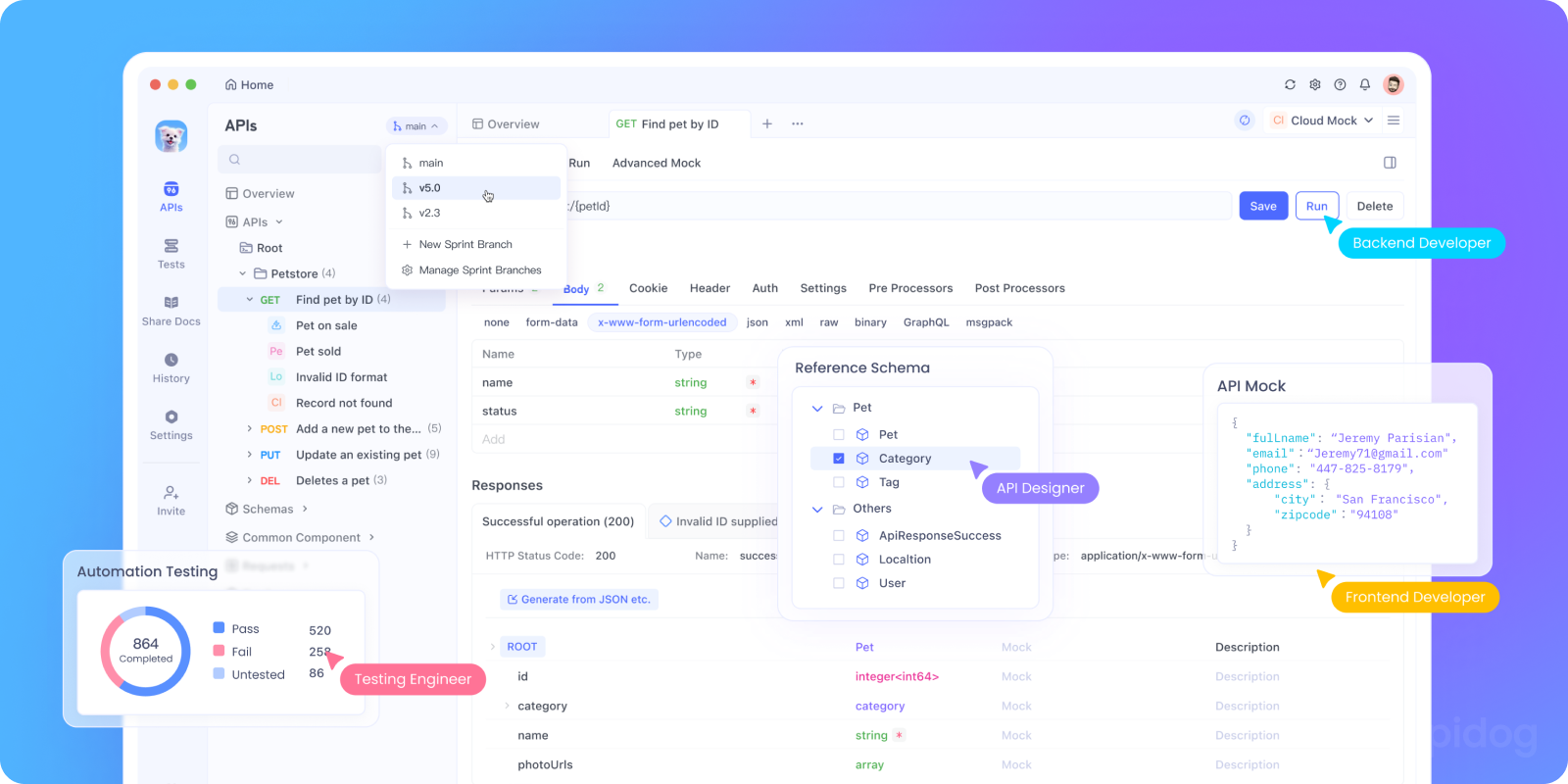Let’s be honest, API management is no longer just a technical necessity, it's become a strategic advantage for modern businesses. If you’re looking to accelerate growth, improve collaboration, protect data, and deliver exceptional digital experiences, understanding the benefits of API management is a must.
Whether you’re building an e-commerce store, running a SaaS platform, or connecting multiple enterprise applications, APIs are the silent workhorses keeping everything running. In this blog post, you’ll discover the key benefits, the challenges it solves, and why tools like Apidog have become essential for organizations of all sizes.
But here’s the catch: without proper API management, things can get messy… fast.
Want an integrated, All-in-One platform for your Developer Team to work together with maximum productivity?
Apidog delivers all your demands, and replaces Postman at a much more affordable price!
What is API Management, Really?
API management is the process of creating, publishing, securing, monitoring, and analyzing APIs in a systematic and scalable way. API management is about controlling and optimizing the creation, deployment, maintenance, monitoring, and security of APIs throughout their lifecycle.
It involves using specialized tools and platforms to ensure APIs remain functional, secure, and high-performing while giving businesses insights into how they’re used. Modern digital environments involve hundreds, sometimes thousands of APIs, connecting services, SaaS solutions, databases, and customer-facing products.
Think of API management as traffic control for your data highways. Without it, you risk:
- Overloading certain endpoints
- Security breaches from unauthorized access
- Versioning chaos
- Poor developer experience
With it, you gain control, visibility, and scalability, which translates into real business value. Without a clear management strategy, API sprawl, inconsistent documentation, security vulnerabilities, and operational headaches are inevitable.
Why API Management Has Become a Business Necessity
In 2025, APIs aren’t just a technical concern. They’re a strategic business asset. Companies are realizing that unmanaged APIs can:
- Slow down innovation
- Leak sensitive data
- Hurt customer trust
- Increase operational costs
API management solves these problems by acting as the central nervous system for all your API interactions. It helps you design, monitor, and optimize APIs so they deliver consistent, secure, and scalable value to your users.
Common Misconceptions About API Management
Some teams still think API management is only for big enterprises. Not true. Even a small startup can benefit from:
- Built-in security without custom coding
- Easy onboarding for new hires
- Reliable version control for faster iterations
In fact, smaller teams often get even more value from API management because it reduces manual overhead.
Let’s break down the most important advantages so you can see how they apply to your business.
1. Improved Security and Access Control
Security is the cornerstone of every successful API ecosystem.
APIs are prime targets for cyberattacks especially when left exposed without authentication or encryption as they can expose sensitive data and system functions to the outside world. API management platforms provide built-in security features like:
- API keys
- OAuth 2.0 authentication
- JWT tokens
- Rate limiting
- IP whitelisting
Benefit: Drastically reduces the risk of unauthorized access, data leaks, and costly compliance violations.
With these, you can control who can access your APIs, what they can do, and how often they can do it.
In Apidog, for example, you can easily enforce authentication policies across all APIs without having to configure each one manually.
2. Better Performance and Scalability
API management platforms effortlessly handle growth.
A poorly optimized API can become a bottleneck, especially under heavy traffic. API management tools enable horizontal and vertical scaling, load balancing, and caching to maintain fast response times under any load. When traffic spikes, whether due to new users or marketing campaigns, your infrastructure must keep up. API management tools help with:
- Caching responses to reduce load
- Load balancing across multiple servers
- Monitoring latency to spot slow endpoints
Benefit: Ensures reliability and performance whether you’re serving 1,000 users or 10 million.
This ensures your APIs can handle growth without breaking.
3. Centralized Monitoring and Analytics
Visibility is power know exactly how your APIs are performing.
Knowing how your APIs are used is as important as securing them. API management solutions provide real-time monitoring, reporting on latency, errors, usage, and other crucial metrics. Analytics also reveal usage patterns, peak times, and potential abuse, helping you optimize performance and plan capacity. API management platforms provide dashboards with:
- Request counts
- Response times
- Error rates
- Usage patterns by location or user type
Benefit: Enables proactive maintenance, data-driven decision making, and continual improvement.
4. Faster Developer Onboarding
API management enables rapid innovation and agility.
A well-managed API includes clear documentation, versioning information, and access, teams can reuse APIs, reduce redundant work, and iterate on their projects at lightning speed. Developer portals, interactive docs, and in-platform testing shorten onboarding times for new developers and partners. This means new developers can start building right away without waiting weeks to understand how things work.
- Benefit: New products and features move from idea to reality faster, keeping your business ahead of the competition.
Apidog excels here by automatically generating interactive API documentation from your definitions, allowing developers to try endpoints live before integrating them.
5. Seamless API Version Management
Without version control, updating an API can break existing integrations a nightmare for both you and your users. API management platforms allow:
- Multiple versions to run in parallel
- Smooth migration from old to new versions
- Clear deprecation timelines
This ensures updates don’t cause chaos.
6. Cost Optimization
Effective API management minimizes costs at every stage.
By tracking usage, you can see which APIs are worth the investment and which are draining resources. Some API management tools even allow monetization models, so you can charge for API access.
- Benefit: Lower operational and support costs, higher ROI from your technology investments.
For instance, if an endpoint is eating up server time but isn’t widely used, you might decide to deprecate it or move it to a premium tier.
7. Compliance and Governance
With data privacy laws like GDPR and CCPA, you need to know exactly how data flows through your APIs. API management enforces policies that mask sensitive data, audit API activity, and restrict access by user role and geography. Automated logging and policy enforcement keep you compliant without draining developer resources. API management helps you:
- Track where sensitive data goes
- Enforce encryption policies
- Maintain audit logs
Benefit: Stronger regulatory compliance and reduced risk of fines or breaches.
This not only keeps you compliant but also boosts customer trust.
8. Streamlined Collaboration Between Teams
API management platforms foster better communication and shared workflow.
In many companies, API work involves multiple departments developers, QA testers, product managers, and sometimes even marketing teams. API management platforms create a single source of truth, so everyone works with the same up-to-date information.
- Benefit: Fewer miscommunications, faster feedback cycles, and more resilient software.
With Apidog, team members can collaborate on API design, testing, and documentation in real time no more outdated PDFs or lost Slack messages.
9. Enhanced User Experience
When APIs work smoothly, end users benefit even if they don’t know APIs are involved. A robust API management process means:
- Fewer outages
- Faster response times
- More reliable integrations
This leads to happier customers and stronger brand loyalty.
10. Future-Proofing Your API Strategy
Technology changes quickly. API management ensures your APIs can adapt to new protocols, standards, and business models without starting from scratch.
Platforms like Apidog regularly update their tooling to support the latest trends, meaning your API strategy stays relevant and competitive.
Why Apidog Is a Game-Changer for API Management

Apidog isn’t just a documentation tool it’s a full API lifecycle management platform. By eliminating the need for separate tools (like Postman, Swagger, and JMeter) and providing a single source of truth, you reduce errors, boost productivity, and achieve unmatched consistency. You can:
- Design APIs visually or with OpenAPI/Swagger
- Test APIs directly in the platform
- Document APIs with live examples
- Mock APIs without confugurations
- Collaborate in real time with your team

This all-in-one approach means you don’t have to juggle five different tools to get the same benefits. With Apidog's visual workflow, automation features, and collaborative workspace, your team will be equipped to meet the complex challenges of API management in 2025 and beyond.
Real-World Example: API Management in Action
Imagine you’re running an e-commerce platform with multiple APIs:
- Payment API
- Inventory API
- Shipping API
- Customer Support API
Without API management:
- Security settings differ between APIs.
- Some APIs slow down during sales events.
- Developers waste time figuring out outdated documentation.
With API management (using Apidog):
- All APIs follow consistent security and rate limits.
- Traffic spikes are handled automatically.
- Documentation updates instantly when the API changes.
Result? Happier customers, fewer outages, and faster innovation.
API management is no longer optional, it’s a core business requirement. From security and performance to collaboration and compliance, the benefits are too big to ignore.



